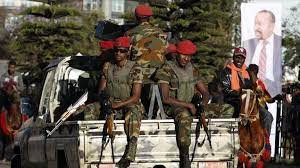
When writing about the Tigray-Ethiopia struggle or any other war in Africa, the first paragraph should always point out that 85% of Africa’s 55 countries are at peace. Africa is not a continent at war.
That said, it is also true that almost all the ongoing wars that are killing more than 1 000 people a month are in Africa, although only one in six human beings lives in Africa. (The Russia invasion of Ukraine is the only exception.) And although the biggest of Africa’s current wars will end soon, it is not ending well.
Tigray is going under. The rebel province of Tigray, despite having only five million of Ethiopia’s 120 million people, has waged a three-year struggle against Abiy Ahmed, the federal prime minister. At one time, its army even threatened to reach Addis Ababa, the country’s capital. But now the war is ending for the Tigrayans in famine, fire and defeat.
The Tigrayans are Ethiopia’s Spartans, tough peasant farmers inured to hardship whose discipline and strong sense of ethnic unity made them formidable opponents in war. They led the long battle to overthrow the Derg, the brutal Communist regime that ruled the country in 1974-91, and then dominated the coalition that ran Ethiopia until 2018.
The Tigrayan politico-military elite did very well during those three decades, and to a lesser extent so did ordinary Tigrayans. This created enough resentment among other ethnic groups that Ahmed had strong support when he ousted the Tigrayans from power four years ago. It was then just a matter of time (two years) until the two sides fought it out.
The federal troops did badly in the early days of the war, but turned the tide after Ahmed acquired military drones from abroad. In the end numbers, technology and a ruthless food blockade that has reduced Tigrayans to near starvation are overwhelming the rebels.
Ahmed has also found a useful ally in Eritrea, a brutal dictatorship that borders on Tigray and has now invaded it with Ahmed’s blessing. (Ahmed got the Nobel Peace Prize in 2019 for signing a peace treaty with Eritrea.) The war will probably end soon in an Ethiopian victory — and more massacres, of course.
There is nothing particularly “African” in this pattern of conflict. There are parallels with Japan’s history in the 16th Century (“the age of the country at war”), France’s in the 17th Century (eight civil wars about religion), or even the United States in the 19th Century (the Civil War, the “taming” of the West, and expansionist wars with Britain, Mexico and Spain.)
- Health talk: Be wary of measles, its a deadly disease
- Health talk: Be wary of measles, its a deadly disease
- PPC projects 126% earnings rise
- Inside Sport: We are expecting too much
Keep Reading
The wars are part of the process of state formation, in which various religious, ethnic and linguistic groups, clans and tribes are gradually hammered together into something resembling a shared identity. It’s often violent and it’s never completely successful, but most African countries only got their independence around 60 years ago so it’s still underway today.
What’s surprising is not the fact of Africa’s wars, but how few of them there are. Europe’s many states — 50 countries in a continent with only half Africa’s population — dwelled in the “cockpit of war” for three centuries before the borders finally settled down. Some borders still haven’t, particularly in eastern Europe.
There is only one special thing about Africa’s wars: how little attention everybody else pays to them. The war in Ethiopia is many times worse than that in Ukraine — an estimated 90 000 casualties on each side in the past month — yet it is almost entirely ignored by both Western and Asian media. Even one mention a week would be surprising. Why?
Dr Tedros Adhanom Ghebreyesus, head of the World Health Organisation, has a dog in this fight. He is Tigrayan, and he thinks it’s racism. In a recent tweet, he speculated that the lack of global engagement with the war in Tigray could be linked to “the colour of the skin of the people”.
Tedrus asked whether “the world really gives equal attention to black and white lives” given that ongoing wars in Ethiopia, Yemen, Afghanistan and Syria had garnered only a “fraction” of the concern for the war in Ukraine.
His thesis would be more convincing if most Yemenis and Afghans and almost all Syrians were not white. They are all Muslim countries, so their wars are fought mainly in terms of religion, but they are really about national identity and state formation too. The rest of the world pays little attention because it dismisses them as just more wars among Muslims.
It is a great pity that most countries seem condemned to go through such a horrible process on the way to a post-tribal future, but that is the way human beings work. It’s happening mostly in Africa and the Muslim world now only because European empires prevented them from doing it earlier.
Dyer is a London-based independent journalist. His new book is titled The Shortest History of War.






